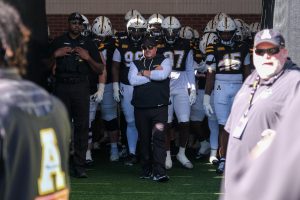Faculty discuss impact of state budget on salaries with local representatives
March 2, 2020
The Republican majority General Assembly and Democratic Gov. Roy Cooper’s inability to agree on 14 bills, stalled the adoption of a new state budget and has the state retracing last year’s spending plan.
During a faculty meeting in Grandfather Mountain Ballroom Feb. 14, one of the main concerns raised was the lack of a current state budget, which is preventing faculty from receiving a raise. Faculty Senate Chair Michael Behrent announced that a group of about 10 faculty members, including Director of External Affairs and Community Relations Matthew Dockham, met with State Senator Deanna Ballard (R) Feb. 17.
“What we talked about primarily was concern about the lack of a state budget and the impact that that is having on the UNC System and specifically our institution,” Behrent said. “While we are specifically concerned with the lack of a state budget, we are also concerned with the decade-long trend with virtually stagnant compensation for faculty.”
Ballard is the chair of the Education Committee and the Higher Education Committee in the North Carolina Senate.
“I voted in support of the UNC System’s budget requests, including further support of the UNC Laboratory School program, increased funding for faculty recruitment and retention, along with about 4% raises for UNC System employees,” Ballard said. “I was able to meet with nearly a dozen ASU faculty members this week to again affirm my support for these critical needs and increased dollars while listening and discussing how best to advocate specifically for ASU within the UNC System.”
North Carolina has a law that maintains the prior year’s level of spending if no new state budget passes. The law is currently in effect because the General Assembly does not reconvene until April.
“The fact that a state budget was not passed does specifically mean that there will be no raises coming from state money since we revert to last year’s budget, but last year there was no such money,” Behrent said.
However, a lack of a budget comes with other issues. No state budget means there are no new state services, like after-school care or opioid treatment, because the budget includes grants for those services.
“Our goal in the Faculty Senate is to contact our state legislators, and other leadership bodies in the UNC System have been in touch with the legislature,” Behrent said. “It [the meetings] also encouraged local boards and boards of trustees because there is a sort of nudge to the state legislature to fund our campuses appropriately.”
Roughly the same group from the Faculty Senate who met with Ballard discussed similar concerns with House Representative Ray Russell (D) Feb. 24.
“Efforts continue to be made to encourage the General Assembly and the Governor’s office to reach an agreement on the state budget,” Dockham said. “In addition to these efforts and with a budget agreement at the forefront, the UNC Board of Governors is in the process of developing a legislative policy agenda for the upcoming short session.”
Dockham said if a budget agreement cannot be reached, there is discussion that an education “mini budget” could be approved and signed by the governor. The mini budget includes meaningful salary increases for faculty and staff, repairs and renovations on campus, funding for faculty recruitment and retention, and capital to renew Wey Hall.
Ballard said the Education Oversight Committee will review critical issues, like the educator preparation program, career and technical education, coding programs for students, among other topics that are important to the future of North Carolina’s education system.
“My argument is that I don’t care what suffers or what doesn’t get built, the priority is the faculty. If you don’t have good-quality, good faculty, you don’t have anything,” said James Goff, history department chair. “If we really want to tell our parents and taxpayers out there that we have the best, then let’s treat them like that they’re the best. Don’t treat them like they’re expendable.”













